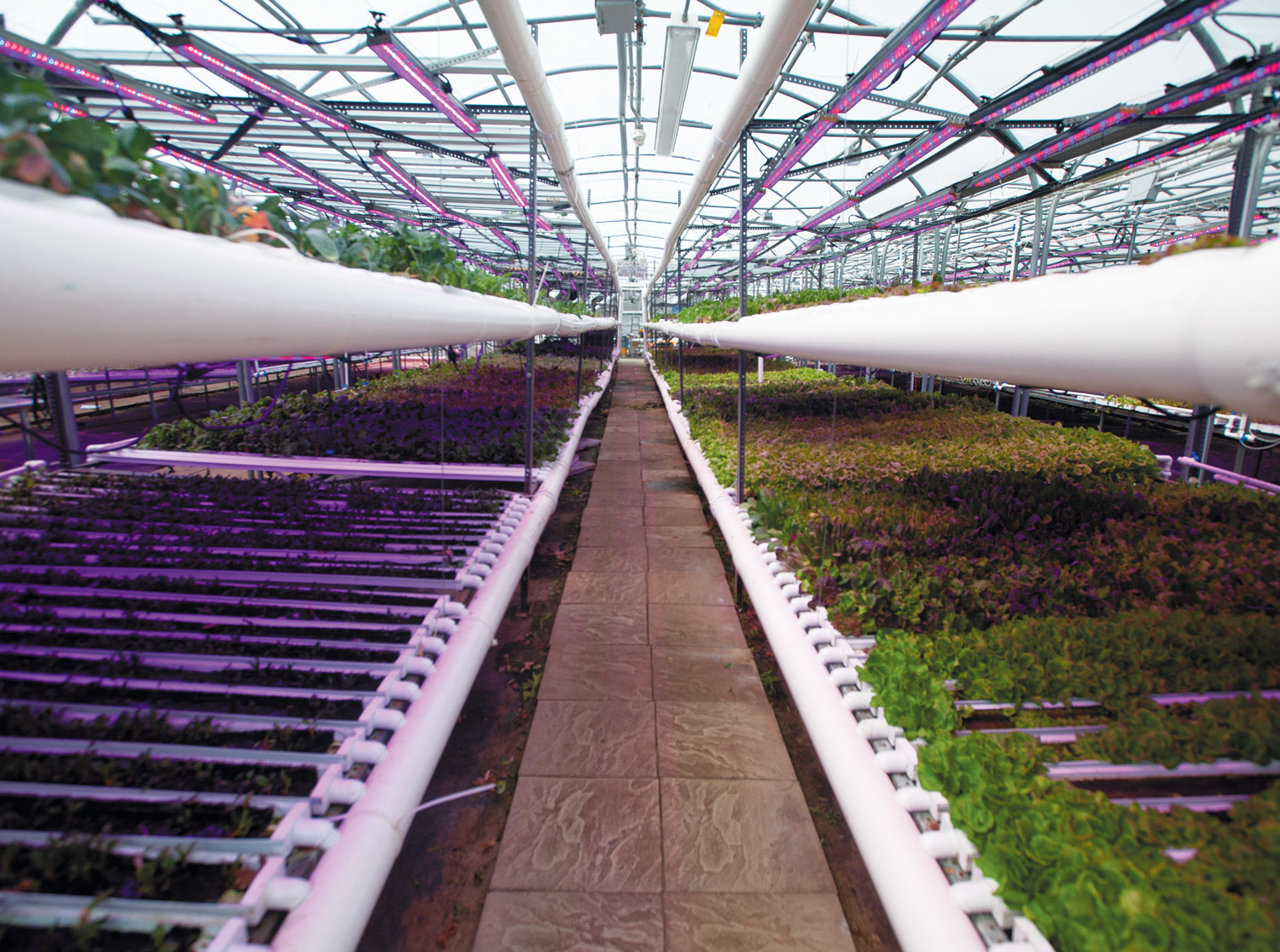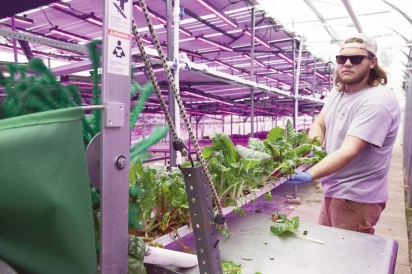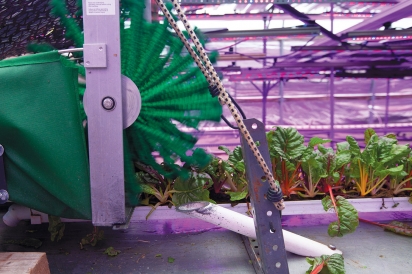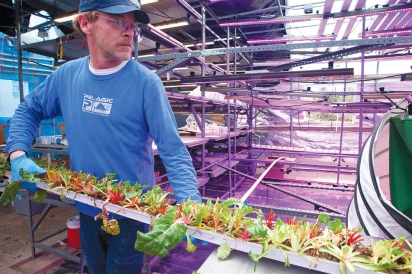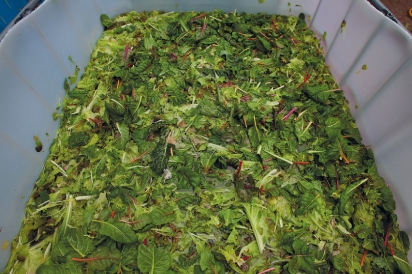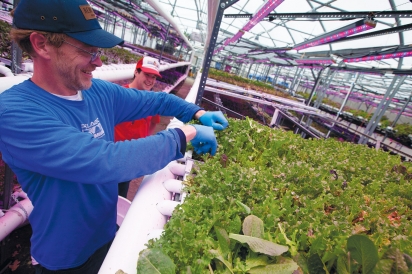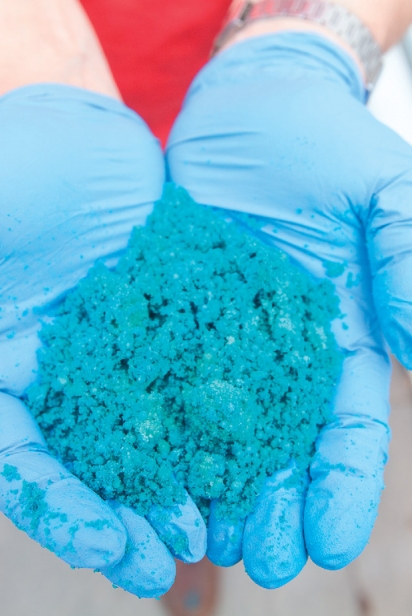An Ever-Green Start-Up
It’s a bright summer day at Ever-Green Farms, which means it’s over 100 degrees in the greenhouse. Under a white semicircle of plastic, a stacked forest of salad greens glows purple under a kaleidoscope of grow lights. Nutrient-rich water slowly circulates through a network of retrofitted gutters and PVC: a hydroponic utopia of chard, kale and baby lettuce.
Mike Howard is looking forward to fall. That’s when the temperature and humidity will drop, the sun will set sooner, and the company will be able to move its growing operation into a new 80,000-square-foot building, made of steel and completely isolated from the sun.
“Sun is by far our biggest problem. We can’t control the conditions, and that affects the product. If we keep conditions consistent, we’ll have young, happy, tasty and nutritious plants,” Howard says, taking a break downwind from a powerful exhaust fan.
Hundreds of pounds of baby greens are harvested from the East Falmouth greenhouse each week, packed into recycled plastic boxes of Cape Cod Summer Mix, Baby Lettuce Mix and Chard Mix that can be found in small markets from Wellfleet to Westport.
Most of the plants in the greenhouse are months old, but with the constant trimming, they look like new. It takes about three weeks from when seeds are sown to the first cut, and then they’re trimmed every five days. Anything older than that will no longer qualify as “baby” and will be donated to the Falmouth Service Center.
“Baby is what the market wants. People don’t buy as much full-grown chard as salad mix,” says Brandon Cardoza, who wears many hats at Ever-Green Farms, including sales manager.
At a price point that rivals bigger-name brands, Ever-Green Farms’ products are a surprisingly rare local option for ready-to-eat salad. “Our greens are cut, packed and to the customer within 24 hours,” Howard says. “It doesn’t drive across the country, so consistency and quality is much better.”
But if Howard has learned anything in the three years he’s been a hydroponic greens farmer, it’s that there will be variables. Until Ever-Green Farms hooked up to their own wells this summer, the system ran on town water, which required daily testing for chlorine levels. (Chlorine affects how plants take up nutrients, especially iron.) As temperatures spiked, green aphids ravaged the plants, until wasps were brought in to control them. They’ve weathered transitions in management, fickle distributors and a busted cooler over the last year with aplomb.
Dealing with natural variables while planning a major expansion is just part of being a start-up for Howard and his partners. “It’s as much an R&D job as a farming job,” said Howard. “I’ve put my engineering background to work here.”
Unlike his younger partners, Howard came into farming in a roundabout way. In his previous career, he commuted to his job as a network manager for a large telecom firm in Boston. But after a divorce and a cancer diagnosis, as a single working dad, he knew he had to make a change. So, he quit the engineering job and started working in the hydroponic greenhouse at Coonamessett Farm. A couple years later, he responded to an ad for what was then called Let Us Farms. Despite a relative lack of experience (combined, all three partners have about ten years in farming), they bring a sense of humor, dedication and can-do attitude to the greenhouse that hasn’t failed them yet.
“There’s a lot we don’t know. As long as you embrace that, you accomplish a lot along the way,” says Howard.
Trial and error has led to some miraculous innovations, such a using burlap as a growing medium instead of the foam traditionally used in hydroponic systems. “That was a Hail Mary that worked,” Howard said, lifting a row of greens to reveal a dense carpet of roots, patch- worked with burlap. Over the past year, Howard has redesigned the network of racks and gutters and set up an automated computer system to control temperature and water circulation. The hope is that he and his partners will receive text alerts in case of a problem, rather than staying awake at night wondering if they remembered to shut the louvered windows.
Though hydroponic growers have a degree of control that traditional farmers never experience, it also requires constant tweaking. Ideal growing conditions are 68 degrees during the day, 58 degrees at night, humidity no greater than 55%, a water temperature of 64 degrees and a pH between 5.5 and 6.3. Since those ideal conditions are rare, Cardoza conducts water and leaf testing on a regular basis and adjusts the nutrient mix accordingly.
“I never thought I’d use my high school chemistry every day. It’s a fun, worthwhile challenge,” he says, pouring a bag of nutrients derived from mineral salts into a 55-gallon drum. Once the right ratio of iron, calcium and phosphorus are mixed, it’s metered out to the plants from a huge water tank.
While not certified organic—and some advocates insist that hydroponics are inherently not organic—Ever-Green Farms does not use chemical pesticides or fertilizers. The company keeps algae and bacteria at bay with hydrogen peroxide, and use biocontrols like wasps to eat pests.
“Frankly, chemicals are expensive, scary, and mean it would take longer to safely harvest the produce,” Howard says. “Also, my kids eat this stuff.”
Another environmental concern is wastewater. Every week, Cardoza cleans the water tank to remove algae and nutrient build-up. He empties the water into a tank outside, so the liquid evaporates and the remaining nutrients and algae can be used as fertilizer on trees on the property.
“We don’t want to release nutrient-laden water, especially here on the Cape,” says Howard.
A long-term goal at Ever-Green Farms is to incorporate aquaponics into a closed-loop system so that there is no waste of water or nutrients. In a separate experimental system, crop manager Jake Turner is raising goldfish, snails and the filter feeder plecostomus. The fish feed on water hyacinths, which thrive on the algae that naturally occurs in the tank, and their resulting waste enriches the water that feeds an array of plants—greens, herbs and even a lime tree—with no need for synthetic nutrients. While the company shies away from using fish waste to directly feed the plants (more for logistical reasons than health concerns), they plan to use the experimental plants for seed propagation.
The closed-loop concept extends to energy use as well. The new building will feature LED grow lights, a roof covered with thin-film solar and a geothermal-powered water pump. A 900-kW solar array on elevated stands outside will serve dual use as an energy source and shade for cash crops like hydrangeas.
With a $3000 electricity bill each month, it’s both environmentally-and business-savvy for the farm to produce its own energy. “The idea is to get as energy-neutral as possible,” says Howard, noting that their ambitious goal depends on changes in ambient light and heat throughout the year.
The new energy-efficient building will not only have more floor space, it will be tall enough to handle 15 levels of growing racks. Howard estimates that by the end of the year, 100 pounds of greens will be harvested from each rack every five days. “That’s like 15 acres of productivity on two acres of ground,” he says.
Aquaponics will also take on a greater role in the expanded farm. A concrete storage shed has been converted to a 30-foot pond, which will be used to breed and raise koi. The farm plans to grow a majority of the soybean feed for the fish, and use their waste to fertilize a field of strawberries. Not only will koi ponds make Ever-Green Farms a more attractive place for visitors, the most attractive fish can fetch hundreds of dollars each on the live market, Howard says.
Though koi are not edible fish, the proof of concept is most important, Howard says. His ultimate vision is to maximize the amount of food that can be grown in a small amount of space, scalable and adaptable to any environment.
“We have to double our food production [to feed a growing population] and [greenhouses] are one way to do it. We can use abandoned malls, factories, or even military bases, like one we were consulted on in Newfoundland,” Howard says. “It creates employment, lowers the cost of produce, has a health benefit and creates local food. In this business model, everyone wins.”
Ever-Green Farms
25 Crocker Road, East Falmouth


